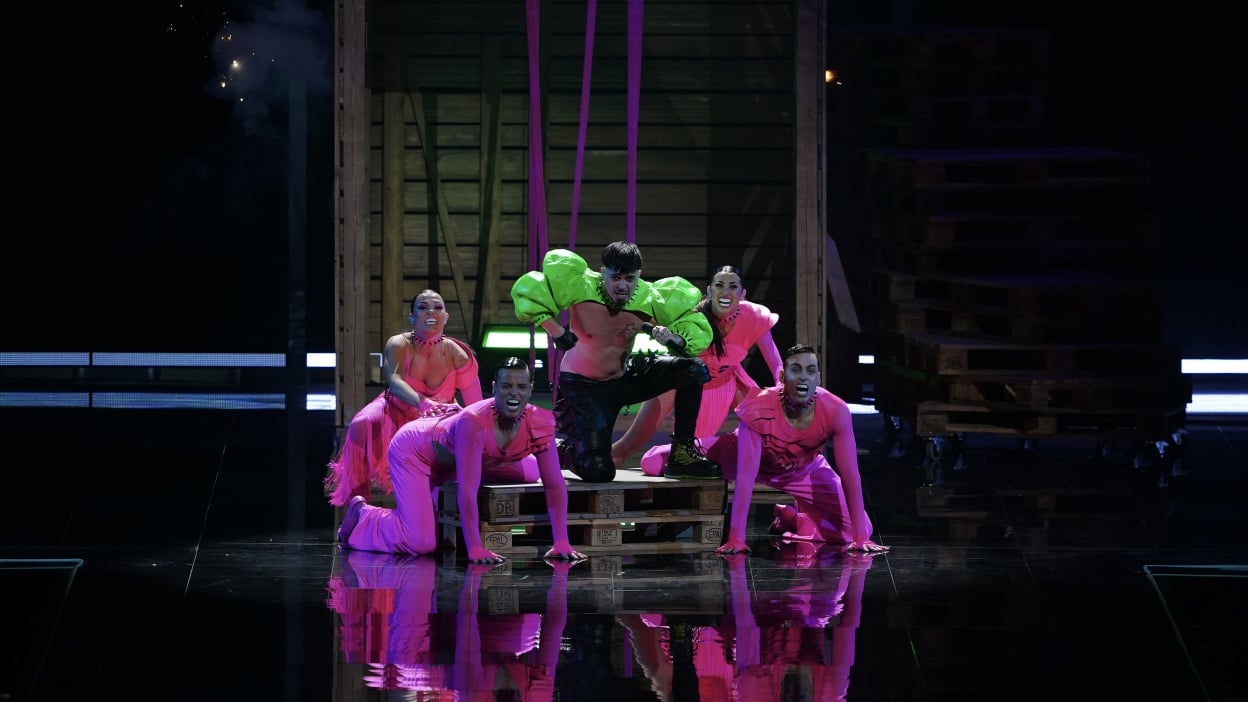Estonian Eurovision Act Chooses Italian Parody For Semi-Final

Table of Contents
H2: The Song Choice: A Bold Strategy for Eurovision Success?
The Estonian Eurovision act's selection of an Italian parody is undoubtedly a high-risk, high-reward strategy. The song, tentatively titled "[Song Title]", is a departure from typical Eurovision fare.
H3: Analyzing the Parody's Lyrics and Musical Style:
“[Song Title]” blends elements of Italian pop, incorporating infectious melodies and a playful, almost comedic, lyrical approach. The song draws inspiration from [mention specific Italian artists or musical styles, e.g., classic Italian film scores, Neapolitan songs, modern Italian pop].
- Key lyrical themes: [List key lyrical themes, e.g., love, satire of Eurovision itself, a humorous take on Italian stereotypes, a story with a twist].
- Musical influences: [List specific musical influences, e.g., Domenico Modugno, Mina, modern Italian pop artists].
- Target audience: While seemingly niche, the song's catchy melody and humorous approach could appeal to a broad audience, capturing the attention of viewers who might not typically engage with Eurovision.
H3: Strategic Implications for the Estonian Entry:
Choosing a parody song for Eurovision is a daring move. It presents several potential advantages and disadvantages.
- Potential for virality: The novelty of the song could lead to significant online buzz, potentially generating a viral campaign. The humorous element could resonate with younger audiences particularly active on social media.
- Appeal to a wider audience: The unique style might attract viewers who are not typically fans of Eurovision, expanding the potential audience for the Estonian entry.
- Risk of alienating traditional Eurovision voters: Some traditional Eurovision fans may find the parody style too unconventional or lacking in emotional depth, potentially impacting the voting outcome.
H2: The Artist's Background and Motivation
[Artist's Name]'s past performances have shown a consistent commitment to originality and pushing creative boundaries. This Italian parody perfectly encapsulates that ethos.
H3: [Artist's Name]'s Past Performances and Musical Style:
[Artist's Name] is known for [describe the artist's previous musical style and successes. Mention any previous Eurovision participation or notable achievements].
- Previous albums/songs: [List notable albums and songs, linking to relevant sources where possible].
- Notable achievements: [Mention any awards or significant milestones in the artist’s career].
- Musical influences: [Describe the artist's musical influences that might have contributed to this choice].
H3: The Decision-Making Process Behind the Italian Parody:
The choice of an Italian parody was not a spur-of-the-moment decision. [Artist's Name] and their team have carefully considered the strategic implications. [Include quotes from the artist or their team explaining their reasoning if available. If not, speculate based on observable facts].
- Artist's comments on the song choice: [Insert direct quotes if available, otherwise paraphrase their likely motivations].
- Reasons for selecting an Italian parody: [Discuss potential reasons – perhaps a commentary on Italian culture, a strategic attempt to stand out from the competition, or simply a reflection of the artist's personal taste].
- Involvement of songwriters/producers: [Mention the individuals involved in creating the song, highlighting their expertise].
H2: Public Reaction and Predictions
The reaction to the Estonian entry has been a mixed bag, reflecting the highly subjective nature of Eurovision.
H3: Initial Fan Response and Social Media Buzz:
Initial fan reaction on social media platforms like Twitter and Instagram has been lively. [Describe the range of responses – positive, negative, surprised, etc.]. [Include specific statistics on mentions, hashtags, or trending topics if available].
- Social media trends: [Mention relevant hashtags and trending topics].
- Fan comments: [Summarize the dominant sentiments expressed by fans].
- News articles: [Link to relevant news articles covering the reaction].
- Initial betting odds: [Include current betting odds, if available, showing the song's perceived chances of success].
H3: Expert Opinions and Predictions for the Semi-Final:
Eurovision experts are divided on the Estonian entry’s chances. Some believe the unique approach will resonate with voters, while others express concerns about its unconventional nature.
- Expert predictions: [Summarize the opinions of key Eurovision commentators and analysts].
- Analysis of potential voting patterns: [Discuss factors that could influence voting patterns, considering demographics and musical preferences].
- Comparison to similar Eurovision entries from the past: [Draw comparisons to previous Eurovision entries that utilized similar approaches, analyzing their success or failure].
3. Conclusion:
The Estonian Eurovision act's decision to present an Italian-style parody for their semi-final performance is a significant gamble with the potential for considerable rewards. The unique song choice has generated significant buzz, both positive and negative, and its success will largely depend on how well it resonates with Eurovision voters. Will this bold strategic move propel [Artist's Name] to the final? Only time will tell.
Call to Action: Keep your eyes peeled for the Estonian Eurovision act’s performance in the semi-final! Don't miss the unique Italian parody that's already generating significant buzz within the Eurovision community. Learn more about the Estonian entry and vote for your favorite! Let's support this brave and original Eurovision 2024 act!

Featured Posts
-
 Section 230 And Banned Chemicals A Landmark E Bay Ruling
May 14, 2025
Section 230 And Banned Chemicals A Landmark E Bay Ruling
May 14, 2025 -
 Le Silence D Alexis Kohler Face Au Senat Un Manque De Transparence Denonce
May 14, 2025
Le Silence D Alexis Kohler Face Au Senat Un Manque De Transparence Denonce
May 14, 2025 -
 Premier League Agent Meets With Liverpool And Arsenal
May 14, 2025
Premier League Agent Meets With Liverpool And Arsenal
May 14, 2025 -
 Recent Walmart Recall Dangers Of Unstable Baby Dressers
May 14, 2025
Recent Walmart Recall Dangers Of Unstable Baby Dressers
May 14, 2025 -
 Arsenal Eyeing Premier League Star David Ornsteins Claim
May 14, 2025
Arsenal Eyeing Premier League Star David Ornsteins Claim
May 14, 2025
